On October 21, 1921, President Warren G. Harding delivered the first speech by a sitting U.S. President against lynching in the deep South.
Harding Spoke Out
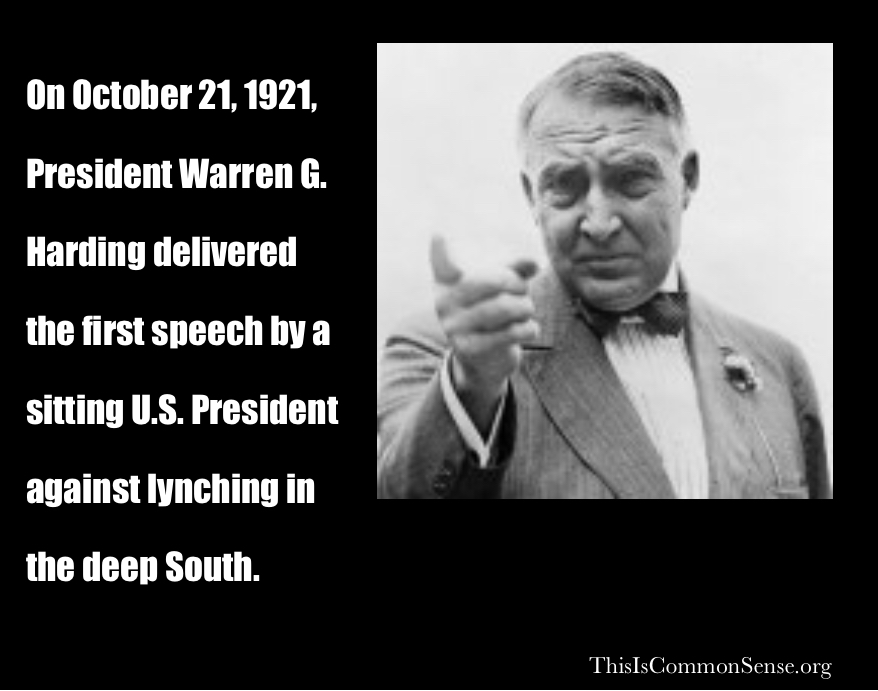

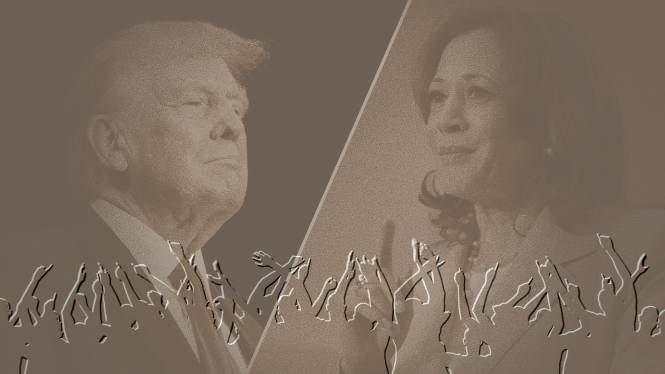
“David Becker, who funneled millions of ‘Zuckbucks’ into the 2020 election, is super certain that former President Donald Trump will raise concerns about noncitizens voting in the 2024 election,” writes Logan Washburn at The Federalist. “And he’s even more certain he doesn’t want you paying attention when it happens.”
Washburn argues this is a strategy. “Becker claimed those with election integrity concerns about noncitizen voting — potentially a widespread issue entering November — are simply setting the stage for Trump to blame an election loss on noncitizens voting for Kamala Harris.”
But is it “simply”? Is the concern with non-citizens voting only an excuse for a Trump loss?
Readers of Common Sense with Paul Jacob are more than familiar with the reality of Democrat politicians and activists pushing for (and allowing) non-citizens to vote, and know the arguments against such a practice.
Could hyper-partisans like Becker have more on their minds?
You have to admit, though, that merely asking the question makes people’s heads hurt. Getting noncitizens in America to vote is bad itself, but accusing those interested in it only as preparing an excuse could itself be a cover-up-in advance for … an illegal election strategy? Or a way to focus on last time’s election rigging and gaming, but not this time? (Meaning, of course, not “a steal,” exactly, more like “underhandedly tilting.”)
Democrats’ fear of excuse making last month, when the article in The Federalist ran, and this month, when Donald Trump has leaped ahead in the polls, casts very different light on all such talk.
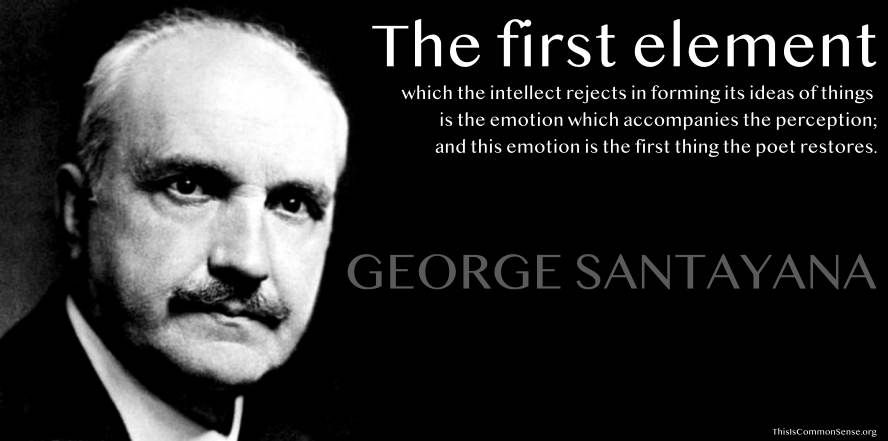
Out of the neglected riches of this dream the poet fetches his wares. He dips into the chaos that underlies the rational shell of the world and brings up some superfluous image, some emotion dropped by the way, and reattaches it to the present object; he reinstates things unnecessary, he emphasizes things ignored, he paints in again into the landscape the tints which the intellect has allowed to fade from it. If he seems sometimes to obscure a fact, it is only because he is restoring an experience. The first element which the intellect rejects in forming its ideas of things is the emotion which accompanies the perception; and this emotion is the first thing the poet restores.
George Santayana, “The Elements of Poetry,” in L. Pearsall Smith, editor, Little Essays Drawn from the Writings of George Santayana, as reprinted in Modern Essays (1921), Christopher Morley, editor.
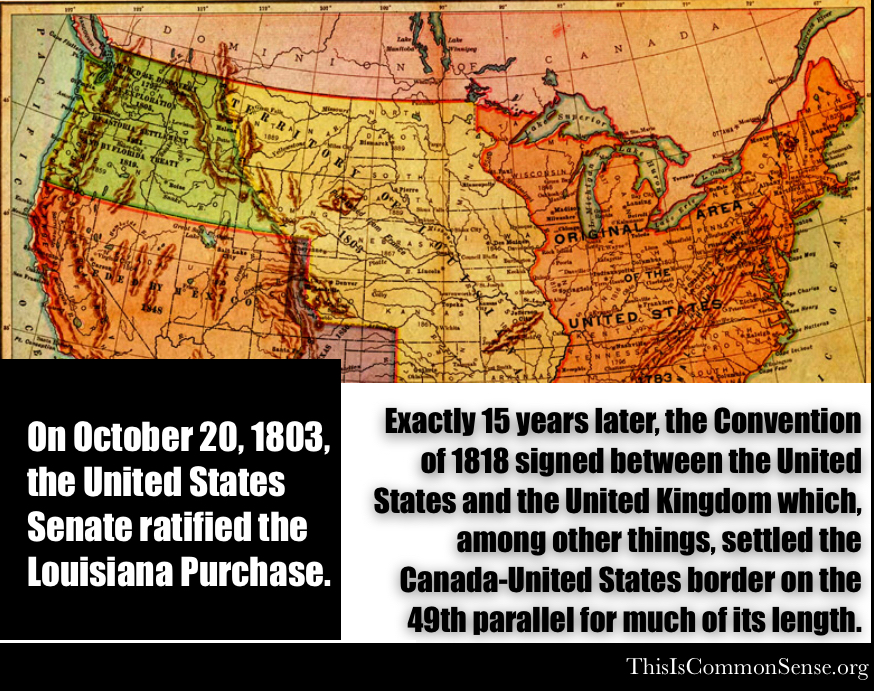
On October 20, 1803, the United States Senate ratified the Louisiana Purchase.
Exactly 15 years later, the Convention of 1818 signed between the United States and the United Kingdom which, among other things, settled the Canada-United States border on the 49th parallel for much of its length.
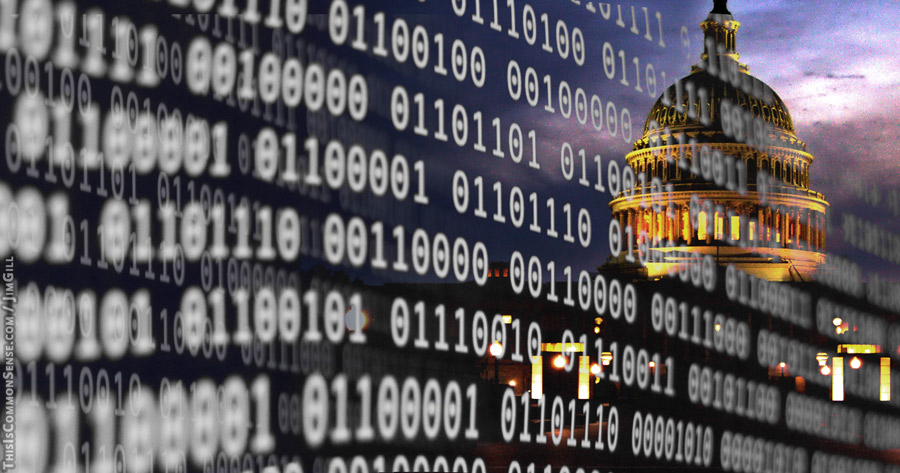
We might call the game “smug-upmanship,” where participants in a debate “fact-check” their opponents in the most smug way, pretending they have “the facts” on their side when, in reality, the facts are uncertain, filled with errors, or merely lies. In cases where the facts are dubious at best, the element of smugness helps. It’s a form of self-consciousness and ‑confidence. And when someone, in debate, exudes so much confidence in a fact or argument, and — during the course of the debate — you cannot readily demonstrate the opposite as true, it’s easy to be bowled over.
On July 30, in “Crime’s Ups and Downs,” Paul Jacob considered what became the Democrats’ smuggest fact-check of the year, the “fact” that the violent crime rate has gone down, not up. Trump said it was up. The FBI said it was down. End of debate?
Jacob Sullum at Reason repeated the Democrats’ take on “the facts,” blaming Trump for crime rising, briefly, on his watch. But Paul Jacob saw a few problems:
Crime spiked in the “Summer of Love” as a result of the mass protests against George Floyd’s death, the left’s demands to “defund the police,” and the climate of approved (“mostly peaceful”) violent riot. Trump’s enemies caused all this. Much of it may have been fueled by pandemic anxieties, but there was another factor: the Democrats’ anarcho-tyranny push to pry Trump out of office in annus horribilis 2020.
Since then crime, which is usually under-reported, now appears to be increasingly under-reported for systemic reasons. Some crimes, such as theft, have been demoted in the law books, allowing theft to run rampant in several major American cities — not just San Francisco — thereby disallowing the uptick in crime to even hit the stats.
What if bad data is the consequence of such policy?
Meaning the perception of an increase in crime is true … at least in some places.
Paul Jacob, “Crime’s Ups and Downs,” July 30, 2024.
Well, now the stats have been revised.
John R. Lott, Jr., argues in his Real Clear Investigations exposé “Stealth Edit: FBI Quietly Revises Violent Crime Stats,” that the initial report of 2.1 percent drop in crime in 2022 depended entirely on under-reporting by cities of actual crimes — and the FBI not adequately figuring for the lack of data. And then not telling us even as it has later accounted for the actual data:
[T]he FBI has quietly revised those numbers, releasing new data that shows violent crime increased in 2022 by 4.5%. The new data includes thousands more murders, rapes, robberies, and aggravated assaults.The Bureau — which has been at the center of partisan storms — made no mention of these revisions in its September 2024 press release.
RCI discovered the change through a cryptic reference on the FBI website that states: “The 2022 violent crime rate has been updated for inclusion in CIUS, 2023.” But there is no mention that the numbers increased. One only sees the change by downloading the FBI’s new crime data and comparing it to the file released last year.
John R. Lott, Jr., “Stealth Edit: FBI Quietly Revises Violent Crime Stats,” Real Clear Investigations, October 16, 2024.
The FBI may have merely erred in its initial report — though that’s unlikely — but it lied in the correction, failing to disclose the magnitude of the original error. The correction was a cover-up.
The Democrats, for their part, engaged in typical smug rhetoric.
And Reason got the chance to stick it, once again, to Donald Trump.
But this seems clear: anyone with a nose for how governments lie, routinely and in partisan fashion, should have caught at least a whiff of this.
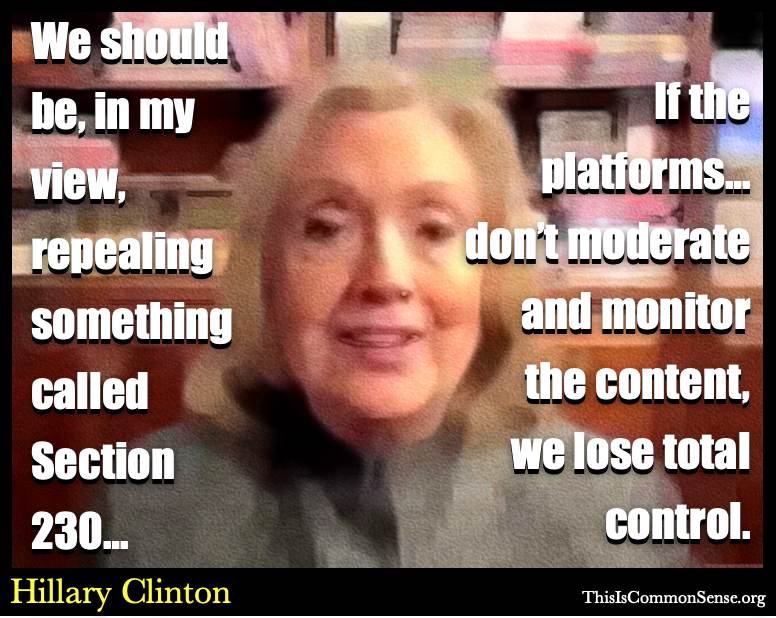
We should be, in my view, repealing something called Section 230, which gave, you know, platforms on the internet immunity because they were thought to be just pass-throughs, that they shouldn’t be judged for the content that is posted.
But we now know that that was an overly simple view, that if the platforms, whether it’s Facebook or Twitter/X or Instagram or TikTok, whatever they are, if they don’t moderate and monitor the content, we lose total control.
Hillary Clinton, talking to Smerconish on CNN about the need for online censorship,